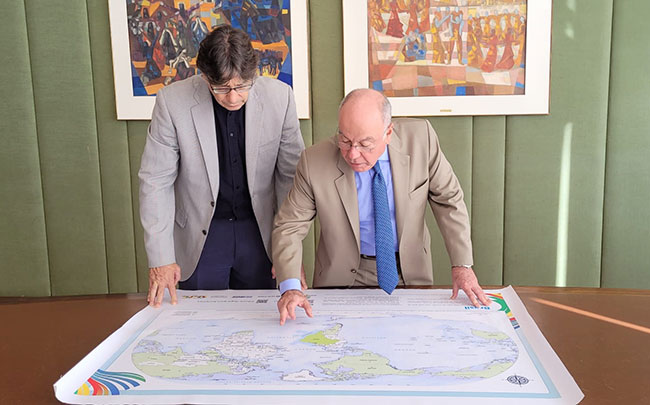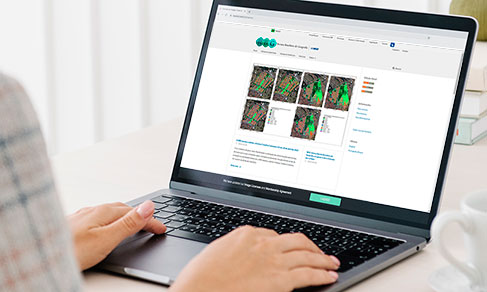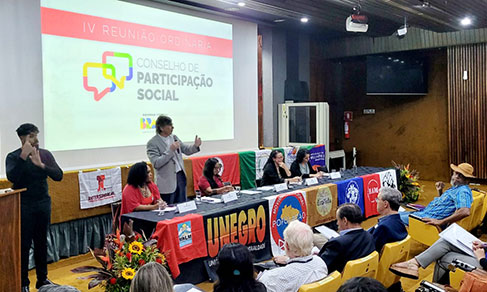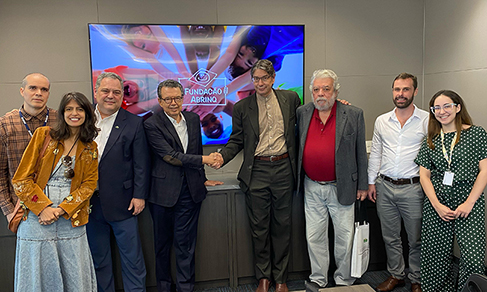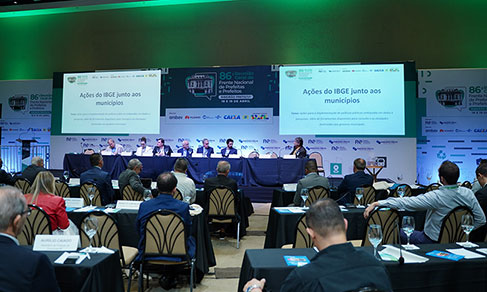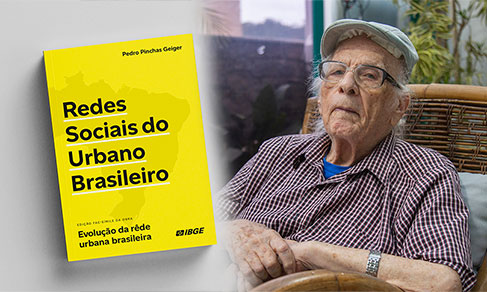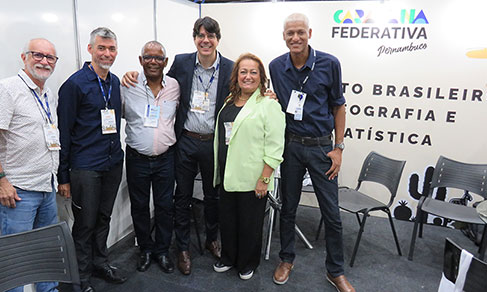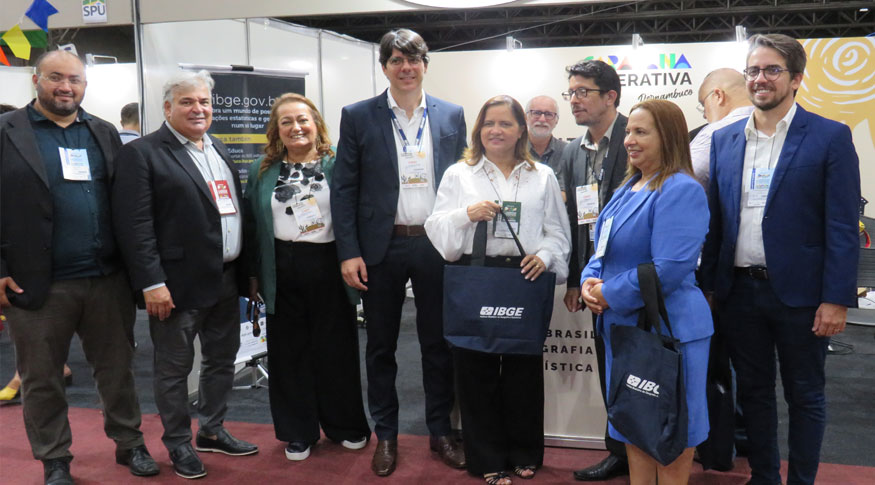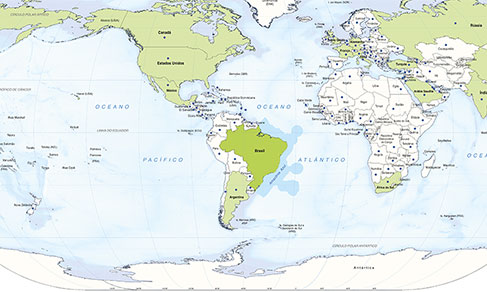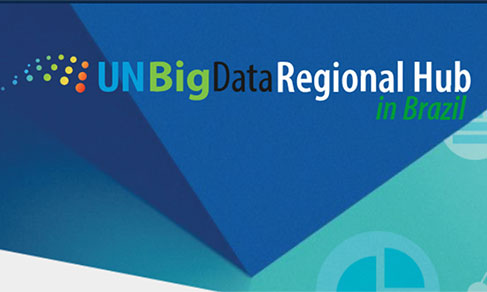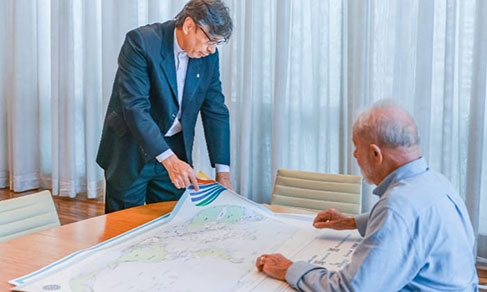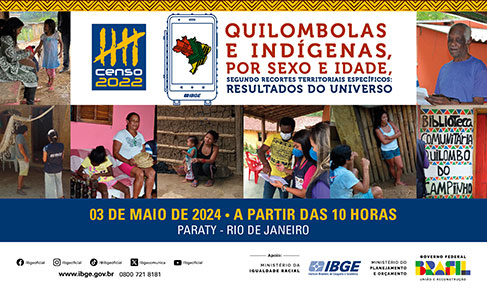Interview: Claudio Crespo sees IBGE present at Brazilians' daily lives
September 25, 2017 09h00 AM | Last Updated: October 09, 2017 10h02 AM
The creation of thematic work groups, formed by researchers from several different departments in the IBGE, aiming at an interdisciplinary view on the planning and analysis of surveys will be one of the innovations to be pursued by sociologist Claudio Dutra Crespo, ahead of the Directorate of Surveys, a position he assumed on August 15 this year.
With the institutional challenge of carrying out, from October 1st onwards, the 2017 Census of Agriculture, which will collect information in nearly 5.3 million rural households and, after that, implementing the National System of Agricultural Surveys, Claudio Crespo highlights that "keeping the quality standards of the IBGE must be pursued by whomever is ahead of the Directorate of Surveys.
A more collaborative work among the areas of the Department began with the creation of the Health WG, aimed at giving support to the National Survey of Health and the National Demographic and Health Survey, which will provide in 2018 an updated profile of the Brazilian population’s health. In order to go further with Indian and Quilombola statistics, a WG of traditional peoples and communities will be created.
The director emphasizes that another target will be the organization and improvement of the national information system, for example, intensifying the partnership with national bodies in charge of producing information for the production of statistics. In practice, the Institute will offer its expertise to train people in the areas of concept standardization and database treatment. Besides, it will redesign the Central Register of Enterprises in order to allow the collection of more administrative records from other institutions.
About the 2020 Population Census, Claudio Crespo says that tests are being run on color and race, impairment and self-administered questionnaires. One of the goals is to assess the possibility of enhancing the collection of information through the Internet. Moreover, the Methodology Seminar of the IBGE, to be held in November, will approach the results of the Census of Agriculture and the preparations and innovations for the 2020 Census.
Bachelor in Social Sciences from the Rio de Janeiro State University (Uerj) and Master in Communication from the Fluminense Federal University (Uff), Crespo was already acting director since Roberto Olinto Ramos (previous director) became president of the IBGE in June. In the IBGE since 2002, the new director was Coordinator of Population and Social Indicators and Manager of Vital Statistics and Population Estimates. He is experienced in the areas of Sociology, population studies and information management. About the quality and reliability of the IBGE products, Crespo highlights that "keeping IBGE quality standards, built over the years, is mandatory to whoever is ahead of the Directorate."
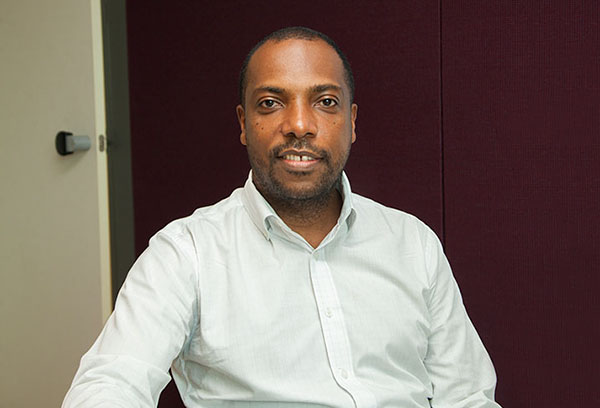
IBGE News Agency: What are your plans for the Directorate of Surveys?
Claudio Crespo: Firstly, keeping IBGE quality standards, built over the years, is mandatory to whoever is ahead of the Directorate." To go further in that direction, currently, we are also training people from the state branches so there is an integrated participation of the IBGE in the mapping processes and in the redesigning of our operations. The objective is to establish best practices as to the quality of statistical production. Secondly, from the management point of view, the aim is to establish a more collaborative work within the Institute, among the several departments of the Directorate of Surveys. We have already started in the socio-demographic field, where we will institutionalize thematic work groups. As the work becomes more and more interdisciplinary, we need a structure beyond the formal one.
The work group (WG) in the health field, for instance, will help the Directorate in the planning of the National Survey of Health (PNS) and of the National Demographic and Health Survey, which will be a great challenge for the IBGE IN 2018, in partnership with the Ministry of Health. So, we will use more the expertise of the technicians spread over the several areas. It is a managing strategy that we want to implement up to the end of 2017 in order to cope with the surveys’ planning and analysis: stimulating the representativeness of the work groups the IBGE is engaged in, at national and international levels, as well as strengthening the partnerships with the technicians at the state branches. For example, we count on a servant of the state branch of Rio Grande do Norte who is PhD in public health to give support to the health work group. Therefore, this kind of knowledge that is spread over Brazil will be in a certain way shared in the planning of surveys and, later on, in the analyses.
Another example is a WG, whose theme will be Traditional Peoples and Communities, aimed at helping the IBGE advance in the information about such population groups. The WG on traditional peoples and communities will continue the very successful work carried out on the Indian peoples in the 2010 Census. Nowadays, we are discussing the concepts that will allow us to get to know better the Quilombolas. In that case, there is also an IBGE servant, from the State Branch of Maranhão, who will be part of the WG, given her knowledge about the theme. Collaborative work will organize knowledge and go deep on the themes, independently from the formal department under which the technician is. Obviously, tasks will be done in parallel with the normal activities demanded by the servant's area. It is a way of organizing time and work and of stimulating the servant, the technician, who will be able to apply all the learned knowledge to the benefit of the IBGE and Brazil, exerting a thematic leadership in the Institute. As a result, the IBGE management profits in terms of solutions for several issues.
We have other reformulation challenges deriving from our work. For instance, based on the data collection of the Census of Agriculture, which will start on October 1st, and on the dissemination of the first results, set for June 2018, we will begin to implement the National System of Agricultural Surveys, i. e., set the sample of what that new system will be like. In the area of surveys per enterprises, we are also faced with the challenge of unifying the questionnaire and the processes of structural surveys (trade, services, industry and construction industry). The project is as big as the implementation of the Integrated System of Household Surveys (SIPD).
IBGE News Agency: How will administrative data contribute to the statistical production?
Claudio Crespo: The administrative records of Brazil have had significant advances and can provide information on several geographic sections and in various periods, which are more and more common demands. This way, the WG we are creating will analyze the feasibility of each one of the administrative data sources, and the IBGE will intensify its partnership with national bodies in charge of producing information, in order to access the administrative records and make the possible links, using information to produce statistics. For example, one of the Projects the Directorate will carry on is exactly the reformulation of the Central Register of Enterprises, because it will allow us to get the administrative records from other institutions and communicate with them.
Another strategy will be to organize and expand the national information system. Offering our expertise in standards, metadata, the IBGE will be able to make training available to other institutions so that the databases can actually interact with one another, i. e., in the area of standardization of concepts and database treatment. Currently, Brazil has a great data production, each sector produces a very high amount of information, but there is lack of standards and harmonized concepts. So, this knowledge the IBGE is willing to share with other bodies will corroborate to the formation of the Information System at the national scope.
There must be a better quality data. Administrative records were produced to meet the administrative needs of each service. They were not conceived to produce statistical information. But, more and more, Brazil and the whole world think such source must be more exploited. In order for this to happen, it must be qualified and the IBGE is pursuing that. The way the IBGE started this process was qualifying its own metadata. Through the internal example, we will be able to offer the service to other bodies. As a result, we will make the sharing possibility available, respecting all confidentiality rules.
IBGE News Agency: What kind of administrative data could be useful to the IBGE?
Claudio Crespo: The record of the income tax of legal entities is a fundamental piece of information, for it makes it possible to advance a great deal in the statistical production in the area of enterprises and national accounts. Another example are real estate records: with access to those data, the IBGE can go further in the production of real estate price indicator. Those are very relevant examples in terms of economy. But the social area can benefit from it too: for instance, health establishments being added to our Register of Enterprises will also allow us better qualification; to carry out traditional surveys as sample ones or by selecting a specific scope within it. Such is the case of Medical and Sanitary Assistance. Certainly, with a constant update of the records of the health establishments, we would be able to conduct more specific and timely surveys.
IBGE News Agency: How does the IBGE figures out the balance between data production and use by society?
Claudio Crespo: Nowadays, the IBGE releases a set of basic indicators to present each produced result. The idea is to move onwards to a System of Indicators (socio-economic, demographic, environmental ones) to provide society with a wider and faster interpretation of the social reality. That means moving from a summary of indicators, without leaving reports aside, to a system of indicators fed by the surveys. We have been already working on some publications since last year, such as the series of studies and analyses, which aim at giving and overall view of national and international social indicators. We had one on households, labor, among others, which present a spectrum of indicators and the construction of information.
The volume of information produced by the surveys is quite large. Our commitment to producing regular information takes much of our time, but each publication aims at more qualified information: both in the existing products or in the new volumes we intend to put out next year. We are working on a specific volume on gender indicators which will be released next year.
IBGE News Agency: We have heard a lot in forums of the need to make information regional, local, for public management purposes, but, on the other hand, it is necessary to harmonize information internationally. How can the Directorate of Surveys find a balance between the regional and universal efforts?
Claudio Crespo: There is, for instance, an international debate on global indicators to measure the 17 Sustainable Development Goals (SDGs) of the United Nations. The National Commission, installed by the Brazilian government, will be also responsible for the definition of national indicators as well. So, the SDG Agenda is conceived globally, but also, regionally – which means to calculate the indicators for each one of the targets looking at the realities of Brazilian states and municipalities. It is an Agenda that fosters global and regional interaction. Obviously, some indicators are more appropriate to a certain state or municipality than to others. So, the IBGE will be inserted in 17 groups playing the role of adviser in the national commission.
IBGE News Agency: How much is society willing to pay for statistics? How can the IBGE defend such an investment in a society lacking resources in basic areas?
Claudio Crespo: The value of statistics goes beyond financial costs. As data is produced by the IBGE, like the unemployment rate, which is part of the Brazilian populations' worries, the daily exploitation of this data is a way of revealing the value it has. Considering the impact of the IBGE-produced information on Brazilians daily lives, our cost is very low. Actually, the high productivity of the IBGE lies in the fact that we portray the population's daily routine. I usually say that from birth to death, life passes trough the IBGE. So, there the IBGE is: collecting information on births, on marriages, living conditions of families, inflation... such things are present at our daily lives. We produce information on technology, enterprise development and performance, on Brazilian economy. We depict the Brazilians' life, their routine. The investment the Brazilian society makes in the IBGE through the Federal Budget has a daily return. What would it be like if we did not know about the unemployment rate? What if we did not know how many Brazilians live in households without income from work? What if we did not know of the importance of social benefits when the economic crisis take place and employment becomes rare? How would life be without such information? So, that's where the importance of the IBGE is. The IBGE is vital, it's like the air we breathe!
IBGE News Agency: Has the 2020 Census already started?
Claudio Crespo: The 2020 Census has already started. The division in charge of the Population Census revised the 2010 Census to analyze what can be improved. We are focusing on the international recommendations; we made some technical visits to other institutes to see their advances, especially in relation to Internet use. We have also run some tests for information on Quilombola Territories, which is an aspect we have to get in touch with. This project results from a partnership with the Directorate of Geosciences. We are aware of the classical themes of an enumeration operation, as fertility, migration, qualified information, the size of the questionnaire. The last Census went to 65 million housing units. So, we need to be straight to the point, clear in our questions, since the Brazilian questionnaire is one of the biggest in the world.
The IBGE Methodology Seminar, which will be held in November, will focus on the Censuses as its theme. We will discuss how to take hold of the results of the Census of Agriculture and how to get prepared for the 2020 Census.
IBGE News Agency: How is the interaction between statistical and geoscientific surveys?
Claudio Crespo: It has become more and more necessary. The IBGE brings it since its origins, but we are working on this interaction. The spatial analysis is an increasingly important tool, since space says a lot about our reality. Sometimes, structural aspects that cannot be collected directly form the respondent are revealed by the space. Surveys and Censuses cannot be conceived without this dialogue. Therefore, the tendency is for the areas to become more and more integrated.
Interview: Adriana Saraiva and Marcelo Benedicto (with the collaboration of Francisco Alchorne)
Photo: Licia Rubinstein


